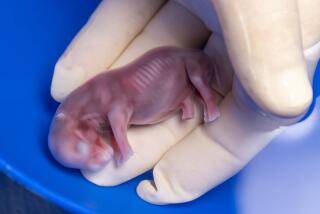Ling-Ling’s Eggs Could Possibly Be Used in Birth of a ‘Test Tube’ Cub
- Share via
WASHINGTON — Ling-Ling, the National Zoo giant panda that died Wednesday, may still help give birth to a “test tube” cub because eggs saved from her ovaries could eventually be placed in another panda in an effort to reproduce the dwindling species, zoo officials said Thursday.
Ling-Ling, beloved resident of the zoo for 21 years, died of heart failure at age 23, a ripe old age for a panda, zoo officials told a news conference.
She “lived a good, long life” and apparently did not suffer before her death, pathologist Richard Montali said.
Zoo officials said they harvested about 100 eggs from Ling-Ling’s ovaries after her death.
They hope to fertilize the eggs with sperm from Hsing-Hsing, Ling-Ling’s mate and the only other giant panda in the United States, and freeze the fertilized eggs for eventual placement in a female panda.
Veterinarian R. Mitchell Bush said the eggs are being developed like tissue cultures, and it will not be known for about a week whether they are viable.
Other efforts at breeding Ling-Ling and Hsing-Hsing have had sad results, as the cubs either were stillborn or died quickly from infections.
Zoo officials said that while they would love to receive a giant panda replacement for Ling-Ling, who was a gift in 1972 of the Chinese government, they would seek a replacement only under an international cooperative breeding agreement.
There are only about 1,000 giant pandas surviving in China, and fewer than 15 in zoos outside their homeland.
More to Read
Sign up for Essential California
The most important California stories and recommendations in your inbox every morning.
You may occasionally receive promotional content from the Los Angeles Times.













